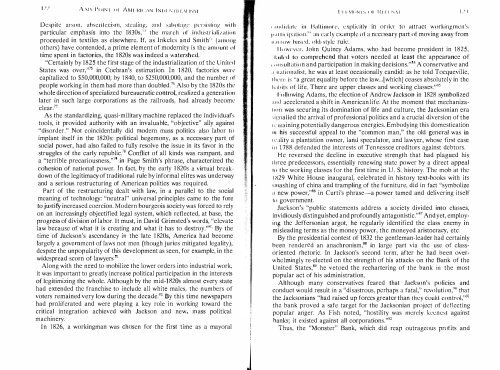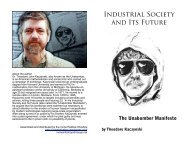CONTENTS - ouroboros ponderosa
CONTENTS - ouroboros ponderosa
CONTENTS - ouroboros ponderosa
You also want an ePaper? Increase the reach of your titles
YUMPU automatically turns print PDFs into web optimized ePapers that Google loves.
1.1.' .'\.\1. ... Pf IINI f )J- A t,,1 I 1lt ·,\N INI)[ 1'. I I".-\l I'I\.1<br />
Despite arson, ahscllkeism, stealing, :llld s;[holagl' pl'rsisfillg wi l li<br />
particular emphasis into the 1830s," the march of industriali/ali'''1<br />
proceeded in textiles as elsewhere. If, as Inkdes and Smit h" (alllou<br />
others) have contended, a prime element of modernity is the amount of<br />
time spent in factories, the 1820s was indeed a watershed.<br />
"Certainly by 1825 the first stage of the industrialization of the Uniled<br />
States was over,"" in Cochran's estimation. In 1820, factories were<br />
capitalizcd to $50,000,000; by 1840, to $250,000,000, and the number of<br />
people working in them had more than doubled." Also by the 1820s the<br />
whole dircction of specialized bureaucratic control, realized a generation<br />
later in such large corporations as the railroads, had already become<br />
clear.77<br />
As the standardizing, quasi-military machinc replaced the individual's<br />
tools, it provided authority with an invaluable, "objective" ally against<br />
"disorder." Not coincidentally did modern mass politics also labor to<br />
implant itself in the 1820s: political hegemony, as a necessary part of<br />
social power, had also failed to fully resolve the issue in its favor in the<br />
struggles of the carly republic.78 Conflict of all kinds was rampant, and<br />
a "terrible precariousness,"" in Page Smith's phrase, characterized the<br />
cohesion of national power. In fact, by the early 1820s a virtual break<br />
down of the legitimacy of traditional rule by informal elites was underway<br />
and a serious restructuring of American politics was required.<br />
Part of the restructuring dealt with law, in a parallel to the social<br />
meaning of technology: "neutral" universal principles came to the fore<br />
to justify increased coercion. Modern bourgeois society was forced to rely<br />
on an increasingly obj ectified legal system, which rcnected, at base, the<br />
progress of division of labor. It must, in David Grimsted's words, "elevate<br />
law because of what it is creating and what it has to destroy."'" By the<br />
time of Jackson's ascendancy in the late 1820s, America had become<br />
largdy a government of laws not men (though juries mitigated legality),<br />
despite the unpopularity of this development as seen, for example, in the<br />
widespread scorn of lawyers 81<br />
Along with the need to mobilize the lower orders into industrial work<br />
it was important to greatly increase political participation in the interest<br />
of legitimizing the whole. Although by the mid-IS20s almost every state<br />
had extended the franchise to include all white males, the numbers of<br />
voters remained very low during the decade." By this time newspapers<br />
had prolIferated and were playing a key role in workina toward the<br />
critical integration achieved with Jackson and new, ass political<br />
machinery.<br />
In 1826, a workingman was chosen for the first time as a mayoral<br />
i<br />
!<br />
1 ·.1 I'MI·N I f n· 1






